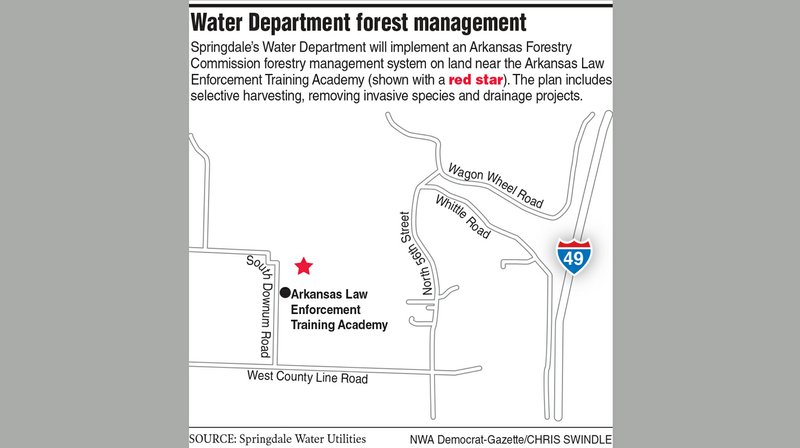SPRINGDALE -- Water Utilities plans to remove selected trees and invasive species on timberland it owns along North Wagon Wheel Road near the Arkansas Law Enforcement Training Academy.
The work also will plant native species and make improvements for stormwater drainage and trails through the area.
Timber shares
The Springdale Water and Sewer Commission has agreed to log selected trees on land the city owns. The price per log the logging company receives from a sawmill will be distributed in the following amounts:
• Walnut log — 60% to utility, 40% logger
• White oak stave logs — 60% utility, 40% logger
• Hardwood logs — 33.3% utility, 66.6% logger
Source: Springdale Water Utilities
"It needs to be logged. It's thick and unmanaged," said George Stowe-Rains, a ranger with the Arkansas Forestry Commission who helped develop the plan.
A healthy forest improves water quality with various species of plants and trees filtering nutrients and sediments in runoff, according to the website of the Illinois River Watershed Partnership.
Members of the city Water and Sewer Commission voted Jan. 15 to accept a bid from Bowens International Logging. Heath Ward, utilities executive director, said the local company submitted the only bid.
"This will not be a clear-cutting operation often seen in south Arkansas," Ward said. "They will have to work under the guidelines of the Forestry Commission."
The bid doesn't list specific costs for the utility to pay. Rather, the logging company will keep a share of the revenue from selling logs to a mill, Ward said. The logging company must share records, receipts, scale reports, payments received and more.
Jerry Whittmore of Jerry Whittmore Lumber in the Nob Hill community said prices a mill will pay for timber vary on the type of tree and quality of wood. The average going rate for timber in Northwest Arkansas is $55 a ton, he said.
Stowe-Rains said he has no way to determine how much timber will be cut on the 100 acres owned by the water department.
Whittmore said the lumber could be used for everything from railroad ties, to pallets, flooring, cabinets, charcoal and sawdust for chicken houses.
"Nothing goes to waste," he said.
A healthy forest is diverse with herbaceous plants, all kinds of wood, a good understory, an overstory and variety of food for all types of animals, Stowe-Rains said.
Selective harvesting can remove older trees to allow younger trees to receive sunlight, nutrients and reestablish an understory, said Nicole Hardiman, executive director of the Illinois River Watershed Partnership. The watershed group works to improve the quality of water in the Illinois River.
Spring Creek runs along the north side of the water utility's property and drains into the Illinois River.
"A healthy forest is a natural ecological process, but invasive trees can disrupt the process. Selective harvesting is just fine," Hardiman said.
Lynn Carver, a member of the Water and Sewer Commission, asked for more information when the logging program was first introduced in December 2018.
"It's a big responsibility cutting trees and doing it the right way," she said then. "People in the community also will be wanting to be reassured. We've got to back it up with the right information."
"I'm really excited about the plan," Carver said Wednesday. "Stowe-Rains very clearly explained that some trees need to come down for the health of the whole forest."
The city-owned utility also provides water and sewer service for some surrounding small towns. It owns about 1,000 acres of undeveloped land in Washington and Benton counties used for drying sludge, Ward said.
NW News on 01/29/2020

